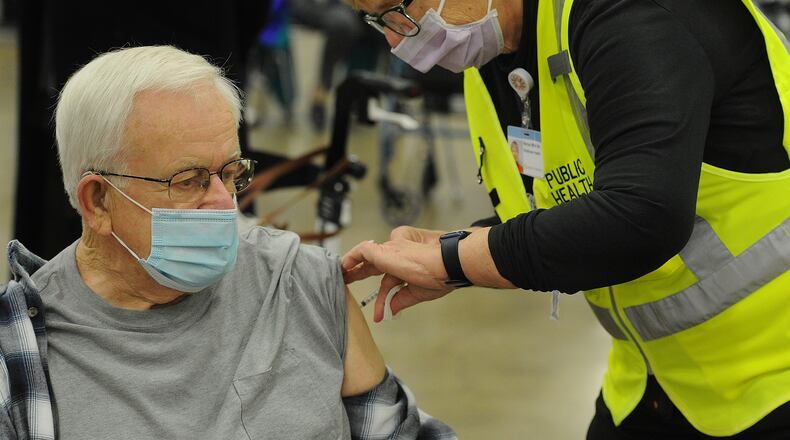As the COVID-19 pandemic persists, new medications and policies are being rolled out to get as many people as possible vaccinated, tested and treated.
For the 64 million Americans insured through Medicare and Medicare Advantage plans (including anyone on Medicare due to certain illnesses or receiving Social Security disability benefits), vaccines, treatment and some tests for COVID-19 fall under their Medicare coverage, but the details can be hard to pin down.
Here’s a quick rundown of how Medicare covers COVID-19 testing, treatment and vaccines.
Does Medicare cover COVID-19 testing?
Laboratory tests
Yes, Medicare Part B (medical insurance) covers all costs for clinical laboratory tests to detect and diagnose COVID-19, including copays, deductibles and coinsurance. You don’t need an order from a doctor, and you’re covered for tests from a laboratory, pharmacy, doctor or hospital. And in some cases, a home health nurse, lab technician or trained medical assistant may be able to administer a test to you at home.
This coverage includes:
- Tests to diagnose or help diagnose COVID-19 that are evaluated in a laboratory.
- Some tests for related respiratory conditions to help diagnose COVID-19, done together with a COVID-19 test.
- Tests at some parking lot locations.
If you were diagnosed with COVID-19 or it’s suspected that you’ve had COVID-19, Medicare Part B also covers COVID-19 antibody tests authorized by the Food and Drug Administration. Also called serology tests, these tests may indicate whether you’ve developed an immune response to COVID-19.
If you have a Medicare Advantage plan, it’s also required to cover clinical laboratory tests to detect and diagnose COVID-19 without charging a copay, deductible or coinsurance.
Over-the-counter at-home COVID tests
Yes. As of April 4, 2022, Medicare Part B and Medicare Advantage members can get eight free at-home COVID-19 tests per month from participating pharmacies and health care providers, according to the Centers for Medicare & Medicaid Services.
Those with Medicare Advantage plans generally don’t get this benefit directly from their plan, but rather through their Medicare Part B enrollment. Therefore, it may be helpful to have your official Medicare card when picking up COVID-19 testing kits.
If you have Medicare Part A only, Medicare doesn’t cover the costs of over-the-counter COVID-19 tests. However, free test kits are offered with other programs.
Members don’t need to apply for reimbursement for the at-home tests. Medicare will directly pay pharmacies to provide the tests free of charge.
Participation in the initiative to distribute free tests is voluntary, so check with your pharmacy or health care providers to see whether they’re participating. You can also find a partial list of participating organizations and links to location information at Medicare.gov/medicare-coronavirus.
The free test initiative will continue until the end of the COVID-19 public health emergency. You can check on the current status of the public health emergency on the Public Health Emergency Declarations site from the Department of Health and Human Services.
Community health centers, clinics and state and local governments might also offer free at-home tests.
Does Medicare cover COVID-19 treatment?
Monoclonal antibody treatments
Yes, Medicare Part B covers monoclonal antibody treatments, which can help prevent hospitalization for people who’ve tested positive for COVID-19 with mild to moderate symptoms.
Medicare Advantage plans are required to cover all medically necessary Medicare Part A and Part B services. If you have a Medicare Advantage plan, you’re covered for medically necessary monoclonal antibody treatments.
Hospitalization for COVID-19
Yes, Medicare covers required hospitalization due to COVID-19, including any days when you would normally have been discharged from inpatient care but have to stay in the hospital to quarantine. For hospitalization, you’ll be responsible for any hospital deductibles, copays and coinsurance that apply.
For instance, if you have Original Medicare, you’ll pay a Part A deductible of $1,556 for 2022 before coverage kicks in for the first 60 days of a hospital stay unless you have Medicare Supplement Insurance, or Medigap, that covers your deductible.
If you have Medicare Advantage, your deductibles, copays and coinsurance will vary by plan.
Telehealth services for COVID-19
Yes, Medicare has expanded coverage for telehealth services during the COVID-19 pandemic. If you use telehealth services for care related to COVID-19, you may be responsible for deductibles or coinsurance. In some situations, health care providers are reducing or waiving your share of the costs.
If you have a Medicare Advantage plan, check if your plan offers additional telehealth services.
Does Medicare cover COVID-19 vaccines and boosters?
Yes, Medicare covers all costs for vaccine shots for COVID-19, including booster shots. There’s no deductible, copay or administration fee. If you get your vaccine at a provider’s office, they can’t charge you for the visit, unless you had other health care services at the same time.
If you require an at-home vaccination, there’s no charge for the vaccination or the shot administration.
Be sure to carry your Medicare card or Medicare number — even if you’re enrolled in a Medicare Advantage plan — so the medical provider or pharmacy can bill Medicare. If you have Medicare Part B and have to fill out a form to get the vaccine, leave any “group number” field blank or write “N/A.”
To find out more about vaccines in your area, contact your state or local health department or visit its website. Vaccines.gov from the Centers for Disease Control and Prevention can also help you find a nearby site offering the right vaccine or booster for you.
If you have questions about Original Medicare coverage or costs, contact Medicare at 800-633-4227 or visit Medicare.gov.
About the Author

